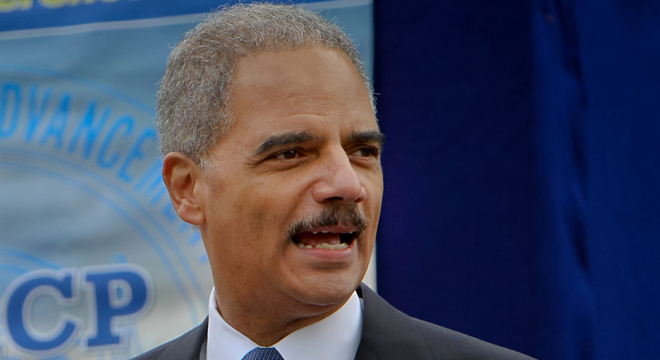The Obama administration believes that executive branch reviews of evidence against suspected al-Qaeda leaders before they are targeted for killing meet the constitution’s “due process” requirement and that American citizenship alone doesn’t protect individuals from being killed, Attorney General Eric Holder said in a speech Monday.
“Due process and judicial process are not one and the same, particularly when it comes to national security,” Holder said. “The Constitution guarantees due process, not judicial process.”
Broadly outlining the guidelines the Obama administration has used to conduct lethal drone stikes overseas, Holder said the U.S. government could legally target a senior operational al Qaeda leader who is actively engaged in planning to kill Americans if the individual (1) posed an imminent threat of violence; (2) could not feasibly be captured; and (3) if the operation was conducted in line with war principles.
Such a use of lethal force against that type of individual, Holder said, wouldn’t violate the executive order banning assassinations or criminal statues because such an act would be in “self defense.” In remarks delivered at Northwestern University Law School in Chicago, Holder also said that targeted killings are not “assassinations,” adding that the “use of that loaded term is misplaced” because assassinations are “unlawful killings” while targeted strikes are conducted lawfully.
The Justice Department’s Office of Legal Counsel (OLC) has so far refused to release a copy of a legal memorandum justifying the targeted killing of the U.S. born Anwar al-Awlaki, who allegedly inspired several attacks or attempted attacks on the U.S.
While not mentioning Anwar al-Awlaki by name — Holder said he “cannot discuss or confirm any particular program or operation” — he arguably referenced his killing by using the example of a U.S. born al Qaeda leader. Holder said that “citizenship alone does not make such individuals immune from being targeted.”
Holder also argued that the due process clause of the Constitution did not mean that federal judges had to review decisions to kill individuals the U.S. government claimed were terrorists.
“The Supreme Court has made clear that the Due Process Clause does not impose one-size-fits-all requirements, but instead mandates procedural safeguards that depend on specific circumstances,” Holder said.
“In cases arising under the Due Process Clause – including in a case involving a U.S. citizen captured in the conflict against al Qaeda – the Court has applied a balancing approach, weighing the private interest that will be affected against the interest the government is trying to protect, and the burdens the government would face in providing additional process,” Holder said. “Where national security operations are at stake, due process takes into account the realities of combat.”
Holder said that any decision to use lethal force against a U.S. citizen is “among the gravest that government leaders can face” and that the American people deserve to be assured that actions taking place on their behalf are consistent with values and laws.”
Holder said that the “imminent threat” evaluation had to take into account what would happen if the U.S. missed its window of opportunity and said the Constitution did not require the President to “delay action until some theoretical end-stage of planning.”
The question of whether the capture of a terrorist is feasible is “a fact-specific, and potentially time-sensitive, question,” said Holder, adding that the “nature of how terrorists act and where they tend to hide” meant capture wasn’t always possible.
Holder also said that the administration informs members of Congress about counterterrorism activities and the legal framework for targeting individuals for killing, which he said was part of a system of “robust oversight”
“The Constitution’s guarantee of due process is ironclad, and it is essential – but, as a recent court decision makes clear, it does not require judicial approval before the President may use force abroad against a senior operational leader of a foreign terrorist organization with which the United States is at war – even if that individual happens to be a U.S. citizen,” Holder said.
Hina Shamsi of the ACLU said ahead ahead of Holder’s speech that the question was whether Holder would offer “meaningful transparency both about the legal standards that the Obama administration uses to determine who can be killed as well as basic facts about who can be targeted.”
Daphne Eviatar of Human Rights First called the question of whether al-Awlaki was a U.S. citizen “sort of a red herring.”
“You cannot arbitrarily kill individuals that you decided secretly are your enemies, even if they are U.S. citizens,” Eviatar said. “It’s not as if due process only applies to U.S. citizens. The bigger question is what made al-Alwaki targetable, was he an operational leader of al-Qaeda with whom were were at war?”






